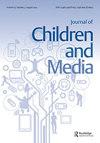Romanian adolescents, fake news, and the third-person effect: a cross-sectional study
IF 2.1
3区 心理学
Q2 COMMUNICATION
引用次数: 6
Abstract
ABSTRACT Despite their apparent digital literacy, adolescents often have trouble assessing the accuracy and trustworthiness of the information they encounter. Given the proliferation of fake news and that adolescents are new (or soon-to-be) voters, important issues arise for democratic processes. This study is the first to investigate Romanian adolescents’ self-perceived ability to evaluate the credibility of the news in their media diet. Drawing on a national survey (N = 1,221) of 12th-grade Romanian students (aged 17–18), we found a significant third-person effect in young people’s self-reported ability to detect fake news. This effect is stronger when people compare themselves to distant others than close others. We also found that the most important predictors of this third-person effect are gender, openness to multiculturalism, and lifelong learning, with family education and confirmation bias being non-significant predictors. IMPACT SUMMARY Prior State of Knowledge: Prior studies show that although adolescents are increasingly aware of the prevalence of fake news, they have difficulty assessing news accuracy. Less is known about how adolescents perceive their capabilities to assess accuracy as compared with their friends and family or with other people in general. Novel Contributions: Romanian adolescents exhibit a strong third-person effect, meaning that they consider themselves more capable of identifying false information than peers in their inner and outer circles. The prevalence of this perception raises serious concerns about their ability to be well-informed participants in the democratic process. Practical Implications: Romanian policymakers should introduce media literacy into high school curricula to develop students’ abilities to assess news accuracy, fact check information, and be better prepared to enter adulthood as informed citizens.罗马尼亚青少年、假新闻和第三人效应:一项横断面研究
摘要尽管青少年具有明显的数字素养,但他们经常难以评估所遇到信息的准确性和可信度。鉴于假新闻的泛滥,以及青少年是新的(或即将成为)选民,民主进程出现了重要问题。这项研究首次调查了罗马尼亚青少年在媒体饮食中评估新闻可信度的自我感知能力。根据对罗马尼亚12年级学生(17-18岁)的一项全国性调查(N=1221),我们发现年轻人自我报告的发现假新闻的能力存在显著的第三人称效应。当人们把自己比作远方的人时,这种影响比亲近的人更强。我们还发现,这种第三人称效应的最重要预测因素是性别、对多元文化的开放性和终身学习,而家庭教育和确认偏见是不显著的预测因素。影响总结先前的知识状态:先前的研究表明,尽管青少年越来越意识到假新闻的流行,但他们很难评估新闻的准确性。与朋友、家人或其他人相比,青少年如何看待自己评估准确性的能力,目前知之甚少。新颖贡献:罗马尼亚青少年表现出强烈的第三人称效应,这意味着他们认为自己比内外圈的同龄人更有能力识别虚假信息。这种看法的普遍性引起了人们对他们在民主进程中成为知情参与者的能力的严重关切。实际意义:罗马尼亚政策制定者应将媒体素养引入高中课程,以培养学生评估新闻准确性、事实核查信息的能力,并为成年后成为知情公民做好更好的准备。
本文章由计算机程序翻译,如有差异,请以英文原文为准。
求助全文
约1分钟内获得全文
求助全文

 求助内容:
求助内容: 应助结果提醒方式:
应助结果提醒方式:


